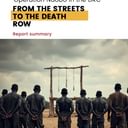
A new study by the organization Together Against the Death Penalty examined the status of capital punishment in the U.S. through a series of interviews and visits to death penalty states in 2010. The report, 999 — The Death Penalty in the United States, was written by Arnaud Gaillard and it exposes some of the serious problems with capital punishment in this country from a human rights perspective. The report calls on decision-makers to take a closer look at the conditions of those awaiting execution and at the risk of arbitrariness in the implementation of the death penalty. Gaillard wrote, “Indeed death rows are not full of innocents. Some of them have committed horrible crimes… When one looks closer, it is likely that the authors of the worst ills in American society are not necessarily the ones found on death row. With luck, sufficient funds and networks, the privileged have the means to escape the death penalty.” The report consists of empirical research, interviews and questionnaires from states like California, Utah, Oklahoma, Texas, Mississippi, Tennessee, Pennsylvania and Virginia.
(A. Gaillard, “999 — The Death Penalty in the United States: A Polymorphous Torture,” Mission Reports of ECPM (Ensemble contre la peine de mort), 2011; posted Jan. 20, 2012). See International and Studies.


